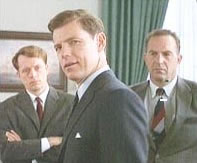Relive a Frightening 'Thirteen Days'
When the world trembled at missile point
(c) CNN.com
January 11, 2001
By Paul Clinton, CNN.com Reviewer
In those dark and trigger-happy days, President John F. Kennedy held the reins of government as the United States came as close as you can get to all-out nuclear war. "Thirteen Days" takes audiences deep into the White House where the president (Bruce Greenwood), his brother, Attorney General Bobby Kennedy (Steven Culp) and their close adviser, Kenny O'Donnell (Kevin Costner), are at ground zero during one of the most challenging events of the 20th century. This film marks Costner's reunion with Australian director Roger Donaldson, who directed "No Way Out" (1987), one of Costner's best movies. The two again have made cinematic magic this time. After "Message In A Bottle" (1999) and "The Postman" (1997) the Academy Award winner needs a solid hit, and this is it. Donaldson has made a well-paced drama from a situation that could have been just a bunch of guys in dark suits and thin ties sitting around yelling at each other. But first came the written word. Through White House tapes, memoirs, CIA documents, personal interviews and oral histories, screenwriter David Self has taken history and turned it into a finely tuned thriller. He's also devised an extremely clever way of telling the story through the eyes of Costner's character, who served as special assistant to the president. (The real O'Donnell died in 1977). So many films, books and TV shows have presented this period, and many other events, from JFK's administration from the viewpoint of the two Kennedy brothers. This time, viewers get a perspective from a third party, not from the glamorous Kennedys of Camelot days. As a result, the film possesses a certain legitimacy others may lack. If you lived through these harrowing times, "Thirteen Days" gives an extraordinary look into the actual events kept hidden from the general public nearly four decades ago. If the missile crisis is something you know only from history class, this film attaches living, breathing characters to one of the most dangerous periods in modern history. In retrospect, President Kennedy made all the right moves to keep the Soviet Union and the United States from triggering a full-scale nuclear attack which would have killed millions. This film shows the intense indecision, contradictory opinions, blatant power grabs and behind-the-scenes intrigue that faced this president during a defining moment in his administration and the history of the world. It began on October 16, 1962, when Kennedy was given photographic evidence of Soviet-installed medium-range ballistic missiles in Cuba, a mere 90 miles from the U.S. mainland -- weapons that in minutes could hit numerous cities, including Washington. The revelation stunned Kennedy, his advisers, and his cabinet, and set up the chief executive for a flurry of conflicting advice. Hawkish military advisers such as Air Force Gen. Curtis LeMay wanted to go to war. Others, such as Adlai Stevenson, the country's ambassador to the United Nations, urged the two countries to talk. Time and again Kennedy could have made the wrong choice and plunged the world into disaster. This film shows the remarkable chain of events which eventually kept us from it. The story cuts from the skies over Cuba, where spy planes dodge Cuban bullets, to the intense debate at 1600 Pennsylvania Ave., to the standoff at sea between U.S. and Soviet ships off the coast of Cuba. Costner is the star, and despite his latest, less-than-successful attempt at mimicking an accent (this time slaughtering the speech patterns indigenous to Massachusetts residents), he nails the role. His character's grace under pressure, his maneuvering along the corridors of power and his relationship with the Kennedys all ring true. However, Canadian character actor Greenwood's portrayal of JFK steals the show; it is compelling and believable. Culp is also extremely good as brother Bobby, capturing the attorney general's badgering intensity. Sure, history at times is simplified (the bungled Bay of Pigs invasion in 1961 gets hardly a mention). In "Thirteen Days," the bad guys are vilified just as much as the good are whitewashed, and events in Moscow don't get a single frame of film. That's OK. This backward look at the Cold War at one of its most heated moments is a history lesson that bears repeating. |
DISCLAIMER: This site is a Steven Culp fan site and is not affiliated with Steven Culp, his family or any of his representatives.
Unless otherwise noted, all captures were made by me from videos from various sources. All shows and photos belong to their respective owners.
NO COPYRIGHT INFRINGEMENT INTENDED!
© 2004-2022 SConTV.com and Steven-Culp.com
Unless otherwise noted, all captures were made by me from videos from various sources. All shows and photos belong to their respective owners.
NO COPYRIGHT INFRINGEMENT INTENDED!
© 2004-2022 SConTV.com and Steven-Culp.com
